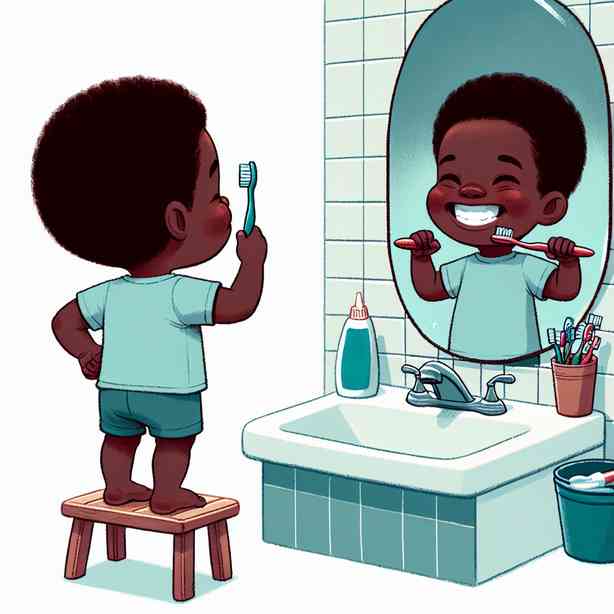
Brushing your teeth is often viewed as a mundane task, something that we perform mechanically each day. Yet, there comes a moment in every person’s life when the act of brushing your teeth transforms from a chore into a meaningful ritual. This significant occasion might be more profound than simply completing a daily hygiene routine; it marks a step towards independence and self-care. This article explores that pivotal moment—the first time you brushed your teeth without being told—and reflects on its implications for personal responsibility, growth, and the importance of oral health.
As children, many of us rely on parents or guardians to guide us through the fundamental practices of self-care. From the moment we are introduced to the toothbrush and toothpaste, our caregivers emphasize its importance. They remind us of the benefits, explaining how brushing helps prevent cavities and maintains our overall wellbeing. The message is clear: oral hygiene is essential not just for a bright smile, but for our health.
The first time you brush your teeth without a reminder signifies a departure from dependence on others. It symbolizes a moment of self-awareness and responsibility. This moment can vary from person to person. For some, it may occur as early as toddlerhood, when they first grasp a toothbrush and mimic their parents. For others, it might come during adolescence when the desire for independence results in improved self-care habits independent of parental involvement.
Reflecting on this moment can elicit several emotions. You may recall the excitement or pride you felt when you realized you could take this responsibility into your own hands. This newfound independence creates a positive ripple effect. As you begin taking control over your oral hygiene, other aspects of personal responsibility may follow. Perhaps you start managing your homework, chores, or personal time more effectively. The correlation between small acts of responsibility, like brushing your teeth, and broader life skills cannot be understated.
Moreover, this occasion can pave the way for an ongoing relationship with your health. When you take initiative in brushing your teeth without prompting, you are making an active choice to prioritize your wellbeing. This decision is not only about maintaining oral health but also about fostering a mindset of self-care. It’s an essential lesson early in life: taking charge of our health requires intention and consistency.
As you nurture this new habit, it’s essential to understand the practice’s significance. Brushing your teeth effectively involves proper technique and timing. Dentists recommend brushing for at least two minutes, twice a day, to ensure all surfaces of each tooth are cleaned. Using fluoride toothpaste helps prevent decay and strengthen enamel. Learning these elements of oral hygiene can reinforce the importance of being informed and proactive about health choices.
The first time you brush without being told also creates an opportunity for us to reflect on broader societal values. In different cultures, oral hygiene may be prioritized to varying degrees, and the tools available for maintaining it can differ vastly. Access to dental care, education, and hygiene products can influence the way communities value self-care. By choosing to brush your teeth independently, you not only embrace personal hygiene but also engage in a practice that has deep sociological implications.
Cultivating a habit of self-care is empowering, especially in a world where individuals are constantly bombarded with responsibilities. The autonomy you first experience when brushing your teeth can translate into more mindful decisions in other areas of your life. It can encourage you to be proactive about your nutrition, exercise, mental health, and personal goals.
Additionally, the transition to brushing your teeth on your own reflects a shift in understanding of health as a holistic journey rather than a series of obligations. Young people today are increasingly aware of the interconnectedness of mental and physical health. Creating a routine where you take charge of your oral hygiene contributes to this holistic perspective. You start recognizing each task— from brushing to flossing—as an integral part of maintaining all dimensions of your wellbeing.
As adults, we often find ourselves feeling preoccupied with numerous responsibilities. The lessons learned during our formative years, such as the importance of being proactive in health, remain relevant throughout our lives. Taking the initiative to engage in small acts of self-care—such as brushing your teeth first thing in the morning or prior to bed—can help create a framework of discipline and self-love.
In conclusion, the first time you brushed your teeth without being told is a moment that transcends a mere routine. It is a milestone of independence, self-responsibility, and an essential element of personal health. As you reflect on that moment, consider how it has impacted your approach to self-care and responsibility in other facets of your life. Each small act of self-care builds the foundation for a responsible, fulfilling lifestyle. Like the simple act of brushing, life is made up of tiny, intentional decisions that lead to our overall wellness. Therefore, embrace that moment of autonomy you felt, knowing it served as a crucial stepping stone towards a lifetime of health and self-awareness. Your oral health is a vital aspect of your overall wellbeing—a commitment that starts with the first brush.


